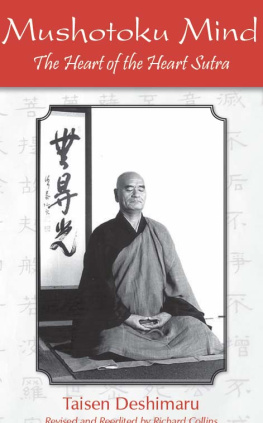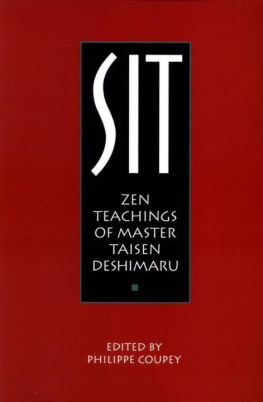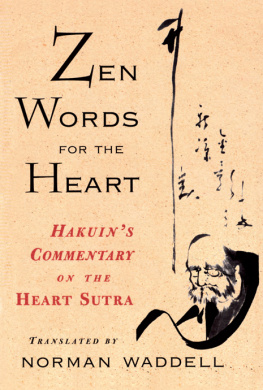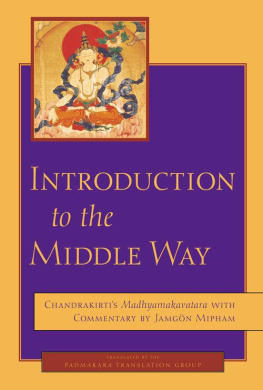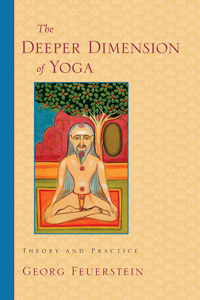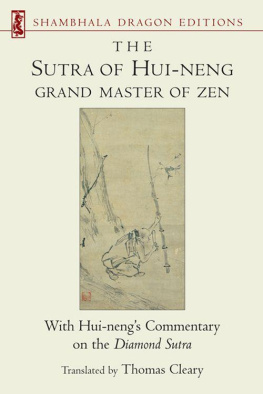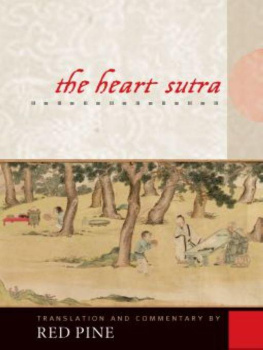
Mushotoku Mind

The essence of the sutra of great wisdom
which allows one to go beyond.
Mushotoku Mind
The Heart of the Heart Sutra
Commentary on the Hannya Shingyo
by
Master Taisen Deshimaru
Edited with an Introduction
by
Richard Collins
Dean of Arts and Humanities
California State University Bakersfield
Based on the translation by Ilsa Fatt
and the edition by ReiRyu Philippe Coupey
HOHM PRESS
2012
2012 by American Zen Association
All rights reserved. No part of this book may be reproduced in any manner without written permission from the publisher, except in the case of quotes used in critical articles and reviews.
Cover Design: Zac Parker, Kadak Graphics, Paulden, Arizona
Interior Design and Layout: Kubera Book Design, Prescott, Arizona
Library of Congress Cataloging in Publication Data:
Deshimaru, Taisen.
Mushotoku mind : the heart of the Heart sutra : commentary on the Hannya shingyo / by Master Taisen Deshimaru ; edited with an introduction by Richard Collins, Dean of Arts and Humanities, California State University, Bakersfield.
pages cm
Based on the translation by Ilsa Fatt and the edition by ReiRyu Philippe Coupey.
English and French; translated from French.
ISBN 978-1-935387-27-5 (trade paper : alk. paper)
1. Tripitaka. Sutrapitaka. Prajaparamita. Hrdaya--Commentaries. I. Collins, Richard, 1952- editor. II.Tripitaka. Sutrapitaka. Prajnaparamita. Hrdaya. English. III. Tripitaka. Sutrapitaka. Prajaparamita. Hrdaya. French. IV.Title.
BQ1967.D47 2012
294.3823dc23
2012016820
Hohm Press
P.O. Box 4410
Chino Valley, AZ 86323
800-381-2700
http://www.hohmpress.com
This book was printed in the U.S.A. on recycled, acid-free paper using soy ink.
Contents
By Philippe Coupey
Mushotoku Bodaisatta: The Practice of Radical Negation
By Richard Collins
Contact Information
Foreword
It all began as a series of oral teachings, or kusen, given in the Paris dojo at rue Pernety in 1977 and 1978.The master spoke in a rough-and-ready English that was translated on the spot into French. The note-takers typically sat close by, writing it down: Anne-Marie Fabbro or Evelyn de Smedt in French, Robert Livingston or myself in English.
At the time the teaching was being given on the Hannya Shingyo (Heart Sutra), however, neither Robert nor I was available as a note-taker, and so it happened that the first edition of this book came out only in its French translation. In 1980 these teachings were published for the first time by the Editions Retz under the title Le Sutra de la Grande Sagesse. In 1988 the book was reprinted by the Association Zen Internationale (AZI) under the same title. In December 2007 the Paris-based AZI Committee had it translated back into English by Ilsa Fatt and, to a lesser extent myself, as The Sutra of Great Wisdom. This so-called translation work also consisted of readapting, rewording and deleting certain unnecessary passages from the French edition.
Now we have it in a new English edition, greatly revised and reedited, thanks to Livingston Roshi and to his disciple Richard Collins of the New Orleans Zen Temple.

The master died in 1982, two years after the book first came out in French. And now, thirty years later it is being published by Hohm Press, founded by the American guru Lee Lozowick. My friend Lee was a great admirer of the Zen teachings of Master Deshimaru, and until his death in 2010 he had promulgated these teachings, particularly in the book SIT: Zen Teachings of Master Taisen Deshimaru (Hohm Press, 1996). So, exactly three decades after Deshimarus death, his commentary on the Heart Sutra is being published in the United States. This is a fine homage to the master.
The mind that does not seek profit, or as the title has it, Mushotoku Mind (mu meaning no, and ushotoku meaning profit)this, I think, is the one single word in the vocabulary of the world most capable of expressing the teaching of Master Deshimaru.
All this is thanks to Richard Collins, and to the dojo in New Orleansin fact, one of the very few dojos in the Sawaki-Deshimaru lineage in the Statesfor his indispensible editorial work. Thanks to them, Deshimarus commentary on the Hannya Shingyo has appeared in the States. And again, thanks to this work, and to many other people in the larger scope of things, the power of Maka Hannya will bring us its own ki, its own mind and vision. I see this everywhere.
For instance, Collins has gone further into this matter than I had, just as I had gone further into it than those before me. Whatever one may think or say, no one can replace us, not even those who came before us, not even the old masters. The practice, the teaching, the spreading of Zen, and of Buddhism in the West, is going to places where only we can take it.
It is sometimes said that every generation surpasses the previous one. In the practice, the teaching, and the spreading of Zen and of Buddhism in the West everyone and everything profits by it, unconsciously and automatically. This is the power of Maka Hannya, and whats more, its the only normal and true way of practice ... To look at new worlds from a higher plateau ...
Philippe ReiRyu Coupey
Paris, France
April 2012
Briefly, there now exist four versions of this text, two in French and two in English: Le Sutra de la Grande Sagesse (Editions Retz, 1980); Le Sutra de la Grande Sagesse (Edition AZI, 1988); The Sutra of Great Wisdom (Edition AZI, 2007); and Mushotoku Mind (Hohm Press, 2012).
This is what is written on the last page of my American passport: Every generation has the obligation to free mens minds for a look at new worlds, to look out from a higher plateau than the last generation. Ellison S. Onizuka, American astronaut.
Introduction
Mushotoku Bodaisatta:
The Practice of Radical Negation
Taisen Deshimaru describes his first meeting with his master, Kodo Sawaki, as a shattering experience. He says the masters room was overflowing with books, sutras, and other works, yet when he asked him if he could borrow some, he was told that such stuff is useless and his desire to read these works was a childish whim. That, says Deshimaru, was his first satori.
The written word has a checkered past in the history of Zen, which offers mind-to-mind transmission of wisdom without scripture and without words. Still, it is difficult to imagine Zen without its literature. Poems, koans, anecdotes, autobiographies, commentaries, sutras, all play a role in the transmission of Zen from the fifth century to the present. These written records, however, can always be only fingers pointing at the moon of zazen.
As an academic, I was fortunate to find myself in the New Orleans Zen Temple. As a reader, I had always been drawn to the cleverness of stories about Rinzai masters, and to the challenge of koans. But this attraction was superficial and intellectual. I was, after all, a professor of English who spent his days in the realm of difficult ideas, poetic expression, and clever manipulations of language. The last thing I needed in the dojo was to break my head every morning, noon, and night against a curriculum of koans.
Next page
